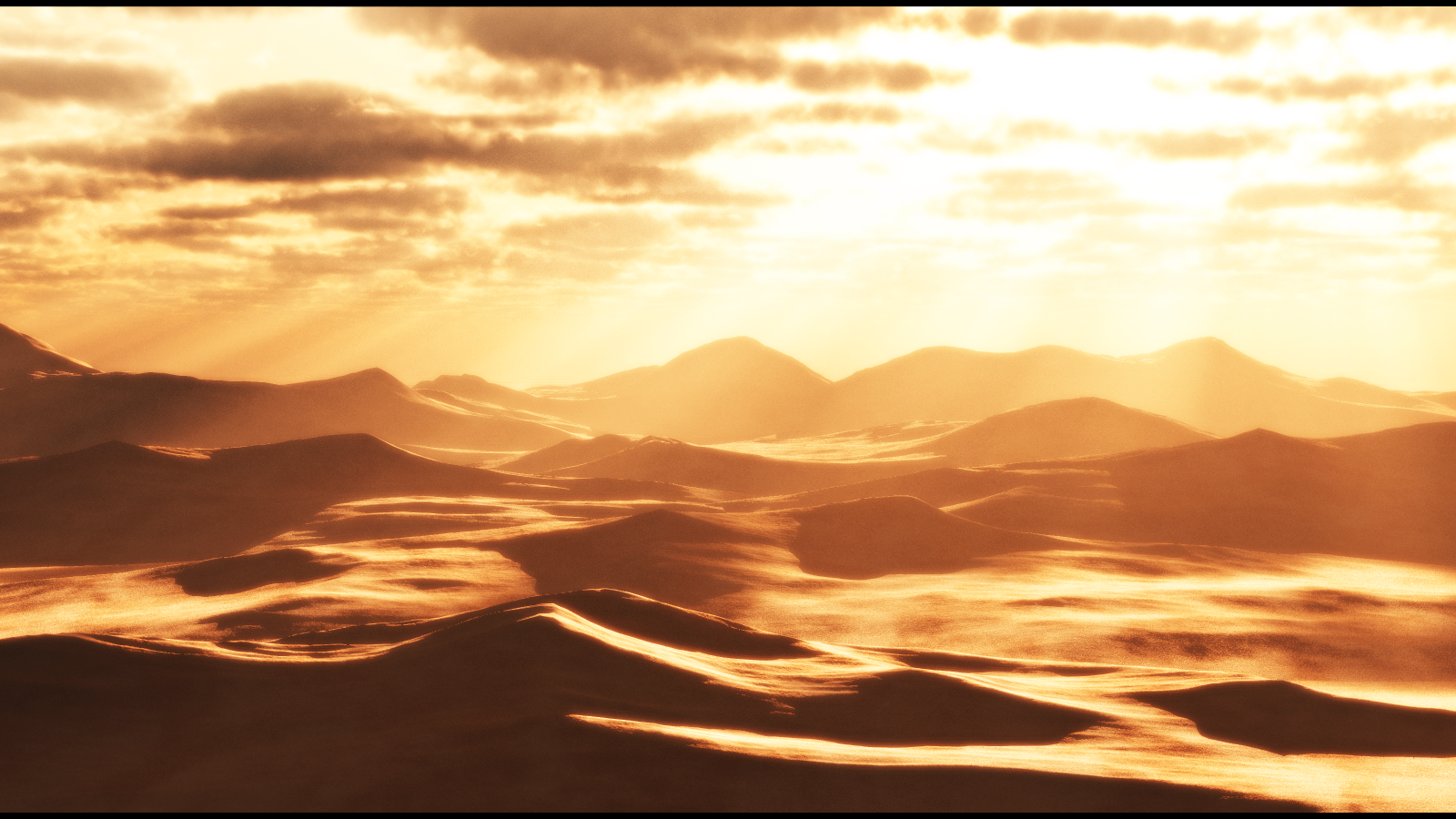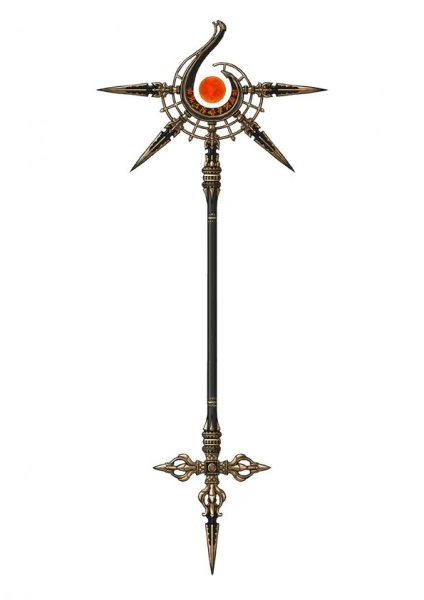 |
| This depiction of the sun-child looms over an eagle to demonstrate his peaceful mastery over it. |
His Holy Person
The sun-child is mute. He appears quite often, especially to those dying of exposure or enduring terrible suffering. His touch heals completely, restoring life and vigor without effort. There is no communication, nor any indication that Solarian understands the significance of his actions. He appears, removes any suffering that he perceives, and vanishes without further consideration. He is a being of pure benevolence, but seems incapable of any emotions or thoughts beyond this. It is uncertain whether he is even capable of understanding a language.
A desert-stranded character dying of dehydration that has caught Solarian's eye might be visited by the godling, have his thirst quenched and health restored, only to return to the same agonizing state a few days later for lack of alternatives. Solarian could very plausibly keep visiting and restoring that character's health for weeks, while never giving a thought to helping them escape the desert or the agony that they are sure to endure there.
Solarian's power is absolute. If it occurred to him that it would remove suffering to transform the Eiginn from an arid wasteland to a verdant forest, he could do so in an instant and without appreciable exertion. But it does not occur to him.
His Sacred Band
Solarian's holy symbol is a sunburst with a face in it, or else any other sort of solar symbol. His clerics garb themselves in white cloth (often silk) and choose their domains from Sun, Life, Healing, or Solitude (depending also on what edition you are playing).
Solarian asks for offerings in the form of scattered grain or water decanted onto the open desert, as well as destroyed weaponry or other instruments of war, long vows of silence, and willing exposure to the elements.
When Solarian appears, time stands still except for Solarian and the creatures to whom he reveals himself. He approaches them, blesses them silently, and wanders away. No other interactions with the deity have ever been recorded.
Feats
These feats are only available to devotees of Solarian.
Vow Of Quescience
Limitation: You must never speak above a whisper. Aside from the obvious practical concerns, your near-silent prayers limit your range: your spells cannot extend beyond close range. This limitation is absolute and cannot be increased via metamagic or other abilities.
Benefit: In return for honoring him with your silence, Solarian grants you a +2 bonus to all of your saving throws. You also have a +2 bonus to checks related to moving silently.
Behold The Countenance
Limitation: You have stared at the sun for so long that your vision is permanently destroyed. You regard this as a sacred state rather than a limitation. Regardless, the blindness inflicted on you is magical as well as mundane, and only a heal spell or better will restore it (nullifying the benefits of this feat until you can remedy the situation).
Benefit: If 5e, you can memorize an extra two spells, per day. If other, you can memorize an extra two spells of your highest spell level. Either way, you also gain a +2 bonus to AC and saves.
 |
| The merciful sun-child shines down upon the holy desert of Eiginn. |
There are many holy place in the Eiginn. One such spot is the Well Of Human Suffering, a lush oasis whose water flows from an exceedingly abundant natural spring. Sentient creatures who drink of this water are wracked with unfathomable agony. The natives mostly use it to water crops and feed their camels. Near the spring is a shrine dedicated to Solarian, to whom the creation of the spring is attributed. A carven stone explains that the well is filled with the suffering that Solarian has removed from mortal men. Since the woes of mankind are many, the well never runs dry.
Another important site is the mountain known as the Palace Of Vultures. Once the location of the largest temple dedicated to Solarian, it was plundered by an army of brigands a little over a century ago. It contained the greater part of the church of Solarian's wealth, and now is infested with desert spirits.
Lviem is the most important remaining shrine. It is founded in the cave-carved cliffs in the stony part of the desert. It is there that novices learn the sun chants and how to officiate various religious ceremonies. A hundred or so priests and novices live in the dry, winding passages.
The Sun-God's Prayers
Aureation (1st-level)
Your blessing causes a creature touched to shine with the light of the sun. They gain 3 temporary hit points and the next attack against them this encounter has disadvantage.
At Higher Levels. When you cast this spell using a spell slot of 2nd level or higher, it imparts an additional 3 temporary hit points for each slot level above 2nd.
Pacifying Halo (2nd-level)
You heal 1d8 hit points and are surrounded with a supernatural aura of peace until the end of your next turn. Any creatures adjacent to you during this time have disadvantage when attacking.
Living Blessing (4th-level)
This spell insulates a sufficiently humble creature touched from death. If the creature affected dies before the next day, they return to life with 1 hit point at the following sunrise. The creature does not suffer any kind of level loss or additional penalty. This spell can only be cast upon creatures with 9 hit dice or less. This spell fails if the corpse is destroyed or disintegrated.1
 |
| This is apparently what a Staff Of Brilliance looks like. |
Sunstone (common trinket)2
This scintillating stone emits light in a close radius. In addition to shedding light while equipped, you heal an additional hit point with your healing spells. If you shatter the sunstone as an action, you are healed 3d8+5 hit points.
Mendicant's Cloak (common cloak)
This humble cloak is threadbare, but contains potent magic. While wearing this cloak, you have a +1 bonus to saves. If it is the only magical item you are equipped with, you also have +10 max hit points.
Staff Of Brilliance (uncommon staff)
This staff has 5 charges. While holding it, you can expend 1 or more of its charges to achieve one of the following effects:
- Water From The Rock (1): While outside of combat, you strike a large natural stone, creating a small crevasse from which bubbles thirst-quenching water. It is enough to provide water for 10 people. Each creature that drinks at least one full dose of the water heals 5 hit points.
- Cleansing Light (2): An otherworldly, colorless light shimmers forth from the staff. You and any living creatures within 2 spaces each heal 1d8+5 hit points. Each undead within that radius suffers 1d8+5 disintegration damage, no save.
- Evoke The Sun (3): This ability can only be used during the day and on the surface. A brilliant sunbeam shines down on 10-foot radius location within close range. Creatures within that area must save or be blinded until the end of their next turn.
The staff regains 1d4 charges daily at dawn. If you expend the last charge, roll 1d20. On a 1, the staff immolates and is destroyed.
1 Players usually eschew most forms of preventative measures that require significant resource expenditure. A 4th-level spell is no joke to parties of 9th level or lower, but might just be worth using under very particular circumstances.
2 I divide magic items into common, uncommon, rare, and unique categories. Deal with it.

No comments:
Post a Comment